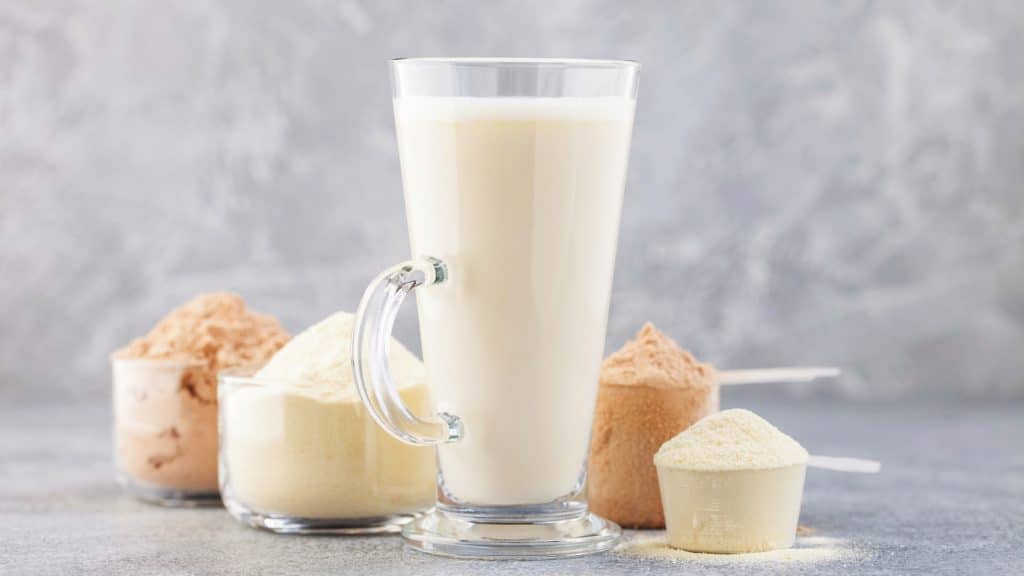There are tons of different whey proteins on the market. You may have heard of whey concentrate and whey isolate, but do you know the difference?
In this post, we will explore the differences between these protein powders, and help you determine which one is right for you.
Hey, I’m Jenn, a Registered Dietitian who has a passion for helping individuals fuel, think, and move towards the best versions of themselves without sacrificing their relationship with food. If you want practical, evidence-based nutrition advice to improve your performance and wellness — Learn how I can help.
Let’s dive in!
What is Whey Protein?
Whey protein is a liquid by-product derived from cows milk that contains all of the essential amino acids.
Cow’s milk is made of two types of protein, casein protein (80%) and whey protein (20%). During the cheese making process enzymes are added to the milk to separate the curd from the liquid whey.
Fun fact: For every pound of cheese produced, 9 pounds of liquid whey byproduct remains.
Whey protein powders are widely popular, with two types dominating the market: whey concentrate and whey isolate. The primary difference between the two lies in the filtration process.

What is Whey Concentrate?
After the whey liquid is separated, to make whey concentrate it is ultra filtered to remove some of the carbohydrates, fat, and water before being dried into powder.
The protein content in whey concentrate after filtration varies between 34-89% protein. The other 66-11% is the remaining carbohydrates and fat that made it through the filtration process..
Whey Concentrate Nutrition Facts
According to the USDA 100g of whey concentrate provides:
- Calories: 369-412 kcal
- Protein: 34.36-80 grams
- Fat: 3.93-6.6 grams
- Carbohydrates: 5.31-50.8 grams
Best Whey Protein Concentrate Powders
Here are the whey protein concentrate powders that I recommend as a performance dietitian:
What is Whey Isolate?
What differentiates whey isolate from whey concentrate is the filtration process. Whey isolate goes through a more rigid filtration and purification process to remove more carbohydrates, fats, and lactose to reach a whey concentrate of at least 90% protein.
Whey Isolate Nutrition Facts
According to the USDA 100g of whey isolate provides:
- Calories: 356 kcal
- Protein: 79 grams
- Fat: 1.98 grams
- Carbohydrates: 7.91 grams
Best Whey Isolate Protein Powders
Here is a list of whey isolate protein powders that I recommend as a performance dietitian:
- Thorne Whey Protein Isolate
- Optimum Nutrition Gold Standard 100% Whey
- Klean Isolate
- Ladder Whey Protein
What is better whey protein or whey isolate?
The choice between whey concentrate vs whey isolate depends on a few factors…cost, goals, and sensitivities.
Whey isolate comes at a higher cost than whey concentrate due to the more complex filtration process and the higher concentration of protein.
When aiming to reach your daily protein intake goal, keep in mind that whey protein powders should only be a small part of your diet. Most of your daily protein requirements should be met by consuming food such as meat, poultry, eggs, dairy, and plant-based protein. However, if you need to supplement your protein intake, whey concentrate and whey isolate are both high quality protein options.
For those who are sensitive to lactose, whey isolate would be a better option of the two. Whey concentrate can contain between 10-55% lactose whereas whey isolate contains 0.5% lactose.
Whey Protein vs Whey Isolate FAQ:
Is whey or isolate better for weight loss?
Protein is a more satiating nutrient compared to carbohydrates and fats. This means that it can aid in weight loss by promoting fullness for an extended period.
Whey concentrate and whey isolate are both high-quality protein supplements that can assist you in achieving your protein intake goals. When combined with a balanced diet and exercise, they can both potentially aid in weight loss.
What are the drawbacks of whey protein isolate?
Like any other supplement, whey protein isolate supplements that are not third party may contain contaminants such as heavy metals. One analysis found that 40% of protein powders had elevated levels of heavy metals.
Look for supplements that have the NSF certified for sport or informed sport certification to make sure you are getting what is on the label.
Does Whey protein Isolate increase muscle?
If you’re looking to build or maintain muscle, incorporating whey protein into your diet can be effective when combined with a strength training program. Whey protein can help you fulfill your daily energy and protein requirements. However, if you’re already consuming enough protein through your diet, taking supplements won’t make a significant impact.
Whey protein supplements are high in the amino acid leucine, which stimulates muscle protein synthesis. Making it a good option post workout if you won’t have time to eat a full meal right away.
Remember that your total daily protein and energy intake combined with strength training are the key factors in muscle growth.

What does whey protein do for females?
Females can benefit from whey protein to meet their protein goals. This can result in increased satiety and lean muscle, which in turn can lead to a higher metabolic rate.
Many females believe that taking protein supplements will cause them to bulk up, but this is far from the truth. There’s more to building muscle mass than simply consuming protein powder.
What are the side effects of whey protein?
While whey protein is generally considered safe, consuming too much of it can lead to digestive issues such as nausea, flatulence, diarrhea, pain, and cramping.
Some people may also be allergic to whey.
Final Thoughts
Both whey protein and whey isolate are great options if you are looking to increase your protein intake to support your performance goals.
While whey protein offers a more cost effective way to get all essential amino acids, whey isolate is a more concentrated source of protein and has less lactose, carbohydrates, and fat.
Ultimately, the choice between whey protein and whey isolate depends on your personal nutrition goals and needs.
Are you ready to stop stressing about your diet and learn realistic strategies that work? Schedule a free 15 minute call today!
Jenn Fink is a licensed and board-certified Registered Dietitian Nutritionist based in Minnesota. Her goal is to help busy people and families prioritize their health by living a balanced lifestyle and feed their families flavorful meals without spending hours in the kitchen. Jenn is passionate about all things food-related and enjoys making complex science easy to understand for her clients and readers.

